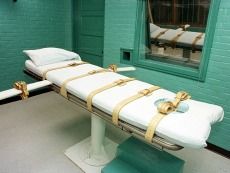Death chamber, isolation cells, and new jails
The government has earmarked funds in next year’s budget for new jails, a “death chamber” and solitary confinement units at the Maafushi jail, but slashed funding for the human rights watchdog to carry out torture prevention programmes and monitor compliance with international human rights treaties.

17 Nov 2015, 09:00
The government has earmarked funds in next year’s budget for new jails, a “death chamber” and solitary confinement units at the Maafushi jail, but slashed funding for the human rights watchdog to carry out torture prevention programmes and monitor compliance with international human rights treaties.
A source familiar with the matter said the finance ministry has cut nearly all of the Human Rights Commission of Maldives’ programme budget, “to the extent that the HRCM will not be able to carry out its mandate.”
International and domestic human rights groups have raised concerns over the “regression” of human rights in the Maldives with the plans to build a death chamber and solitary confinement units.
Some MVR5.5million has been asked for solitary confinement cells, and another MVR4million for the death chamber. Funds have also been allocated for the construction of new jails in Hulhumale, Kaashidhoo and Neykurendhoo with a combined capacity of 900 inmates.
Become a member
Get full access to our archive and personalise your experience.
Already a member?
Discussion
No comments yet. Be the first to share your thoughts!
No comments yet. Be the first to join the conversation!
Join the Conversation
Sign in to share your thoughts under an alias and take part in the discussion. Independent journalism thrives on open, respectful debate — your voice matters.




